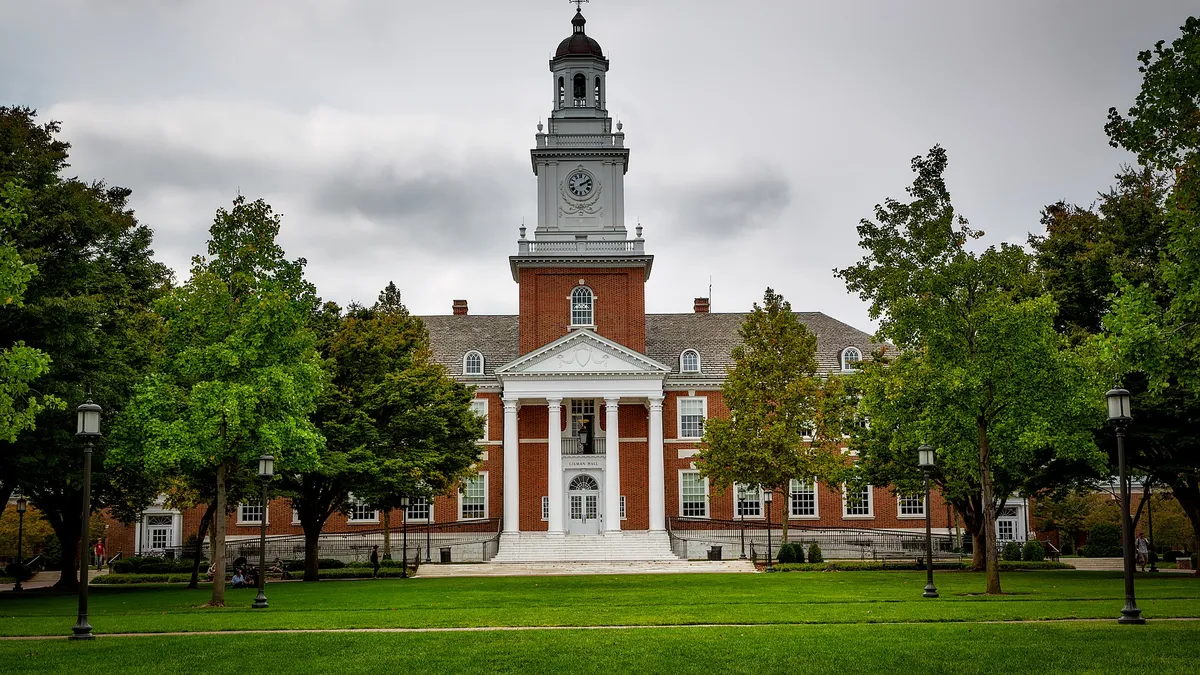Dive Brief:
- The value of gifts to colleges and universities rose 6.1% year-over-year in 2019 to $49.6 billion, the highest level yet, finds the annual Voluntary Support of Education (VSE) survey from the Council for Advancement and Support of Education (CASE).
- However, without a blockbuster $1.8 billion donation to Johns Hopkins University from former New York Mayor Michael Bloomberg, support for higher education would have grown only 3.4% for the period tracked.
- Last year marked a decade of annual gains in giving to higher ed, though the rate slowed from 2018 in part due to the effect of the new tax legislation championed by the Trump administration.
Dive Insight:
The data — which includes responses from 914 institutions and covers the 12 months ending in June 2019 — represents the first full academic year under the 2017 Tax Cuts and Jobs Act, providing "early indications" of its potential impact, CASE President and CEO Sue Cunningham said in a press release.
The tax legislation likely affected individual giving, as some donors "may have pushed several years of contributions" into 2017 because they wouldn't be able to itemize their tax returns after that point, the report notes. That was reflected in increases of 6.9% and 9%, respectively, for alumni and nonalumni giving in 2018. In 2019, alumni giving fell 7.9% and nonalumni giving decreased 3.1%.
A sharp weakening in the stock market at the end of the 2018 calendar year, when donors typically consider gifting stock, might have also contributed to lower levels of individual support in 2019, the report explains. The 426 institutions that reported stock gifts counted 15.2% fewer than in 2018, with a 7.2% decrease in value for the period.
Organizational gifts, meanwhile, have a longer lead time and so "the pattern might be reversed next year," the authors wrote.
Even without Bloomberg's gift to Johns Hopkins, his alma mater, foundations and alumni would have contributed more than half of the funds raised by U.S. colleges in 2019. Since 2007, foundations have given more than alumni.
The data reflects indications that colleges are looking to donors to help them offset lower levels of state support in the decade since the recession and respond to public concerns over the cost of higher education. In recent years, this has resulted in record-setting campaigns and new, philanthropy-supported tuition models.
However, the uptick in giving last year was "unevenly distributed" across the sector, according to the report. Public baccalaureate institutions reported a 29.5% increase in gifts, driven by two institutions. Private research/doctoral institutions raised 14.9% more in 2019 year-over-year. Eliminating Johns Hopkins, the group would have still reported a 6.3% annual increase. Gifts to private bachelor's degree institutions, meanwhile, fell 5.4%.
In 2019, there were eight gifts of at least $100 million, one more than in 2018. The Bloomberg gift put Johns Hopkins first among colleges based on donations, according to CASE data shared with Education Dive, followed by Harvard and Stanford universities. Seventeen institutions pulled in more than $500 million during 2019.
The VSE survey follows data released last week on colleges' endowment spending and returns. It showed continued growth in endowment returns, though rates had slowed from the prior year. Meanwhile, institutions were spending a median of 10% more from their endowments than they did the year before.









